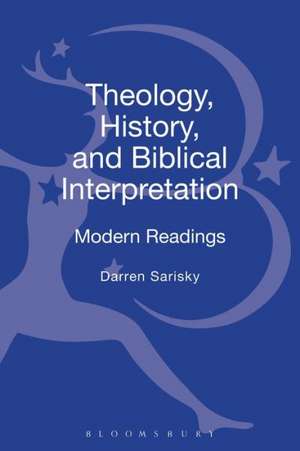Theology, History, and Biblical Interpretation
en Limba Engleză Hardback – 25 mar 2015
Preț: 957.73 lei
Preț vechi: 1221.55 lei
-22% Nou
Puncte Express: 1437
Preț estimativ în valută:
183.26€ • 191.85$ • 151.64£
183.26€ • 191.85$ • 151.64£
Carte tipărită la comandă
Livrare economică 05-19 aprilie
Preluare comenzi: 021 569.72.76
Specificații
ISBN-13: 9780567184276
ISBN-10: 0567184277
Pagini: 504
Dimensiuni: 170 x 244 x 27 mm
Greutate: 1 kg
Locul publicării:London, United Kingdom
ISBN-10: 0567184277
Pagini: 504
Dimensiuni: 170 x 244 x 27 mm
Greutate: 1 kg
Locul publicării:London, United Kingdom
Caracteristici
Discusses the strengths and weaknesses of each approach and considers whether they are finally reconcilable
Notă biografică
Darren Sarisky received his PhD from King's College Aberdeen, UK. He was previously a Junior Research Fellow at Homerton College, University of Cambridge, and is now a Lecturer in Systematic Theology at King’s College London.
Cuprins
1 Spinoza, Benedict de. Theological-Political Treatise. Cambridge: Cambridge University Press, 2007. Chapter 7, “On the Interpretation of Scripture.” 2 Strauss, David F. The Life of Jesus Critically Examined. London: SCM, 1973. Selections from Introduction, “Development of the Mythical Point of View in Relation to the Gospel Histories.” 3 Kierkegaard, Søren. Concluding Unscientific Postscript to Philosophical Fragments. Vol. 1. Princeton: Princeton University Press, 1992. Chapter 1, “The Historical Point of View.” 4 Troeltsch, Ernst. “On the Historical and Dogmatic Methods in Theology.” In Religion in History, 11–32. Edinburgh: T&T Clark, 1991. 5 Barth, Karl. The Epistle to the Romans. Oxford: Oxford University Press, 1968. Prefaces 1–6. 6 Bultmann, Rudolf. “The New Testament and Mythology.” In The New Testament and Mythology and Other Basic Writings, edited by Schubert Ogden, 1–44. Philadelphia: Fortress, 1984. 7 Pope Pius XII. Divino Afflante Spiritu: On Promoting Biblical Studies. Rome, 1943. 8 Ebeling, Gerhard. Selections from “The Significance of the Critical Historical Method for Church and Theology in Protestantism.” In Word and Faith, 17–61. London: SCM Press, 1963. 9 Lubac, Henri de. History and Spirit: The Understanding of Scripture According to Origen. San Francisco: Ignatius, 2007. Selections from the Conclusion. 10 Stendahl, Krister. Selections from “Biblical Theology, Contemporary.” In The Interpreter’s Dictionary of the Bible, edited by George A. Buttrick. New York: Abingdon, 1962. 11 Childs, Brevard S. Introduction to the Old Testament as Scripture. Philadelphia: Fortress Press, 1979. Chapter 3, “Canon and Criticism.” 12 Steinmetz, David C. “The Superiority of Pre-Critical Exegesis.”Theology Today 37 (1978): 27–38. 13 Luz, Ulrich. “Reflections on the Appropriate Interpretation of New Testament Texts.” In Studies in Matthew, 265–289. Grand Rapids: Eerdmans, 2005. 14 Marion, Jean-Luc. God without Being: Hors-Texte. Chicago: University of Chicago Press, 1991. Chapter 5, “Of the Eucharistic Site of Theology.” 15 Schüssler Fiorenza, Elisabeth. “The Ethics of Biblical Interpretation: Decentering Biblical Scholarship.” Journal of Biblical Literature 107 (1988): 3–17. 16 Levenson, Jon D. “The Hebrew Bible, the Old Testament, and Historical Criticism.” In The Hebrew Bible, the Old Testament, and Historical Criticism: Jews and Christians in Biblical Studies, 1–32. Louisville: Westminster/John Knox, 1993. 17 Plantinga, Alvin. “Two (or More) Kinds of Scripture Scholarship.” Modern Theology 14 (1998): 243–278. 18 Ricœur, Paul. “The Nuptial Metaphor.” In Thinking Biblically: Exegetical and Hermeneutical Studies, edited by André LaCocque and Paul Ricœur, 265–303. Chicago: University of Chicago Press, 1998. 40319 Barr, James. The Concept of Biblical Theology: An Old Testament Perspective. Minneapolis: Fortress, 1999. Chapter 12, “Evaluation, Commitment, Objectivity.” 20 Webster, John. Holy Scripture: A Dogmatic Sketch. Cambridge: Cambridge University Press, 2003. Chapter 1, “Revelation, Sanctification, and Inspiration.”
